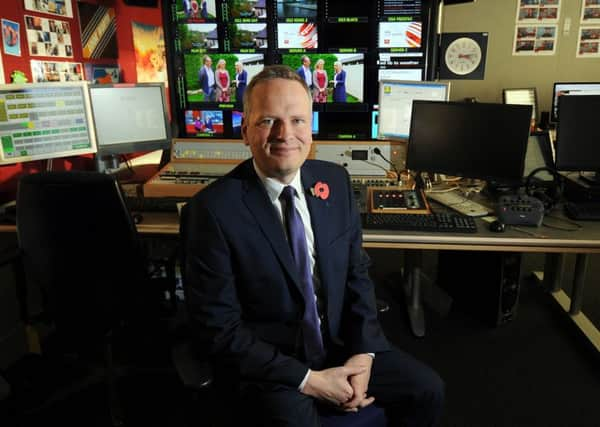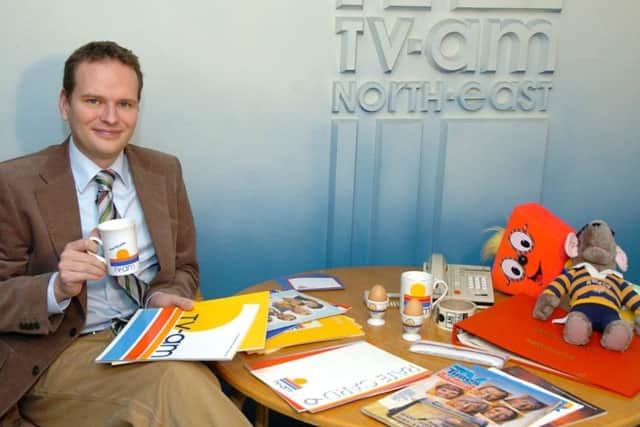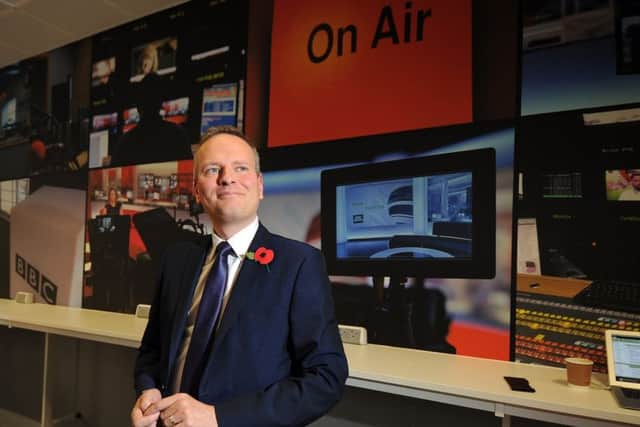From TV-am superfan to Look North frontman: Ian White on 25 years with the BBC


As a child, Ian White developed a rather unusual hobby – watching regional television news broadcasts from different areas of the country. Now almost four decades later, that passion has taken him from a keen viewer to a face familiar to millions of viewers in Yorkshire as a producer, reporter and presenter on BBC Look North.
White, who has recently celebrated 25 years of working for the BBC, is originally from the North East and says his fascination with regional news developed from an early age thanks to his family.
Advertisement
Hide AdAdvertisement
Hide Ad“Every night the news was on TV at 6pm. We watched ITV Tyne Tees news,” says White, sitting in the BBC Yorkshire offices in Leeds. “I just got interested in the fact that where we lived and where my gran lived a few miles down the road got completely different shows. She was near Carlisle and got Border TV.


“I thought isn’t it amazing and that began my interest. I became a bit of an anorak and used to video the news and keep it. I had a friend with relatives in Yorkshire who recorded Calendar and Look North for me. On this VHS, there was this bloke called Harry Gration, who is now on of my colleagues.”
White, who is now 47 and lives in Wakefield, grew up determined to land a job as a news reader and is now living his childhood dream. The Yorkshire Post meets him just after he had finished producing and presenting the lunchtime news and a couple of hours before he is due to present the evening’s main bulletin at 6.30pm.
He says he finds reporting from locations to be more of a challenge than being in the studio. “You really don’t know what is going to be thrown at you and you have to deliver the goods. After you find a story, you have got a few hours to go out, get it filmed and edited.”
Advertisement
Hide AdAdvertisement
Hide AdIt has taken plenty of hard work to get to this point in his career. White, whose father was a policeman and mother a hairdresser, started volunteering on Radio Tyneside, which broadcast to the region’s hospitals, when he was 16.


Ian was still doing his A-levels when he was given his own news programme to present on the station – leading to his big break when he interviewed a local restaurant owner called David Taylor about the state Newcastle’s streets were being left in by weekend drinkers.
Unbeknown to White, Taylor was also a TV producer who offered Ian a job as a researcher. He was set to work on helping with a programme about the history of bicycles. “My specific job was to recreate the scenes they used to have in London with penny farthing bikes, with very specific uniforms,” he recalls. “I had to recreate the 1800s and find some penny farthings and these uniforms. How we did it in the pre-internet age, I have no idea!”
White went on to get a job working in the regional Newcastle office of ITV breakfast show TV-am – a show that he had loved since being a child after it launched in 1983 and became the UK’s most popular breakfast show. But he was only there briefly before the show was taken off the air in 1992 and replaced by GMTV.
Advertisement
Hide AdAdvertisement
Hide Ad“When breakfast TV started in 1983, I was at a very impressionable age and it was this glow in the corner of the living room,” White says. “It had completely flopped to start with and was saved by Roland Rat and then Anne Diamond and Nick Owen.
“So I had always been interested in TV-am as a bit of TV anorak. When it came to an end, I said ‘I will keep the name alive’.”
It was a promise he has more than kept - White began collecting memorabilia, press releases and briefing notes connected to the show and even eventually went on to buy the TV-am intellectual property rights and trademark, going on to set up a dedicated website and a physical archive at his home in Wakefield.
He had to convince a gambling company that ended up owning the TV-am brand to pass it to him. “After a bit of persuasion, they did agree to sell the brand to me.”
Advertisement
Hide AdAdvertisement
Hide AdAfter TV-am went off the air, White briefly worked subtitling adverts before landing a job at BBC Radio Norfolk in 1993. White returned up north in 1996, when he got a job as a newsreader on BBC Radio Leeds and ended up doing TV bulletins for Look North.
From 1998, he was Look North’s late night newsreader and his role today sees him producing, presenting and reporting for bulletins throughout the day.
White says the most professionally-satisfying reports he has done have been ones in which people have trusted him to tell their stories, often in difficult circumstances. He says that includes interviewing Karen Strong, the mother of Jamie Still, a teenager from Otley who was killed by a drink-driver on New Year’s Eve 2010. “She felt I was someone she could trust to tell her story, which is great. We did a few stories and our coverage ended up being spoken about in Parliament.”
White also broke the story of Vikki Thompson, a 21-year-old transgender woman found dead in jail in 2015 after being sent to the male Armley prison in Leeds. An inquest last year concluded Thompson, who was found hanged in her cell after warning several people on her way to jail that she would “leave in a box”, had not meant to kill herself.
Advertisement
Hide AdAdvertisement
Hide AdWhite says he was tipped off about what had happened through his contacts after previously covering stories about the transgender community. “They came back to me and said we have heard about this woman who died in Leeds prison and we trust you to tell her story. It again got mentioned in Parliament and the impact is still going on to this day. The issues around transgender prisoners have become huge and I feel we were slightly ahead of the game.”
White was also among the first reporters on the scene of the Selby rail crash in 2001, in which 10 people were killed and over 80 injured.
“At the time I lived near Selby and we heard there had been a little shunt and I was asked to go and have a look. I turned up to this scene of carnage and devastation, people crying and screaming. I probably lived seven or eight miles from the scene so I was one of the first there. I just rang the producer and said ‘send help’. You can’t really become emotionally involved – as a journalist, you have a job to do. It is like being a policeman or a paramedic.”
But in addition to hard news, White says he also enjoys doing celebrity interviews, including speaking to Dolly Parton when she came to Rotherham to back a child reading initiative. “The great thing about this job is every day is completely different,” he says.
Advertisement
Hide AdAdvertisement
Hide AdWhite says he has been extremely fortunate in how his career has worked out. “TV is my love, it is always what I have been interested in. With any job, when you have been in it a long time, you have to give yourself a bit of a reality check.
“I see amazing things, meet amazing people and know people would give their right arm for this job.”
Advice for aspiring journalists
Ian White has some simple advice for aspiring broadcasters and journalists – be nice.
“That is how you get trust and how you get stories,” he says.
Advertisement
Hide AdAdvertisement
Hide AdWhite says his colleagues at the BBC have been greatly supportive to him over the years, particularly Harry Gration who he describes as a “legend”.
“To be asked to present when he is not here is a big thing,” he says.
White adds that young people who want to make it into a career in television should be determined and clear-sighted about what they want to achieve.
“Follow your dreams, don’t be put off by careers teachers who say you can’t do it and make sure every job you do gets you one step closer to where you want to be.”.